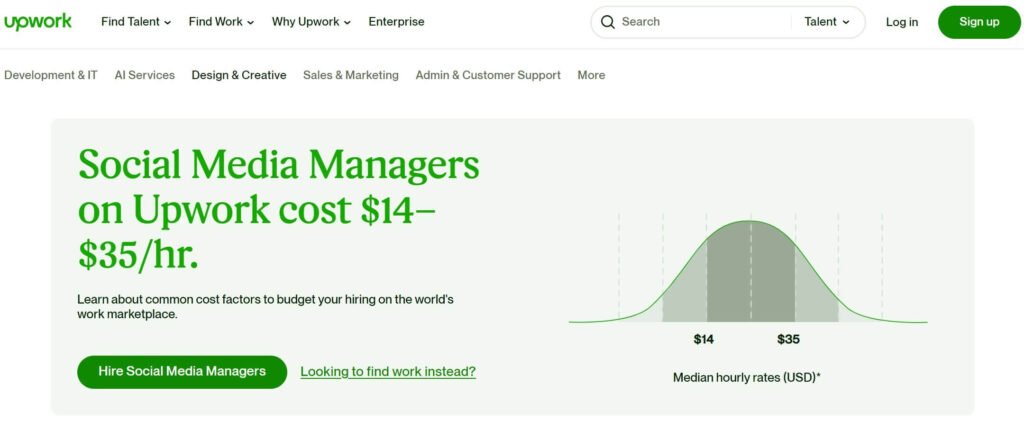
As social media continues to play an increasingly prominent role in businesses, the demand for skilled social media managers is on the rise. They play a vital role in building brand awareness, fostering community engagement, and driving online growth. If you have a passion for social media and want to start a career as a social media manager, this blog is for you.
What is a Social Media Manager?
Social media managers play a crucial role in a company’s overall marketing and communication strategy. They are responsible for effectively managing an organization’s social media presence, including social media content creation, community management, and engagement. Social media specialist work closely with marketing, public relations, and content teams to ensure consistent and engaging brand messaging. They stay updated on the latest social media trends, tools, and best practices to optimize social media strategy and achieve business objectives.
What does a social media manager do?
Social media managers wear many hats in their role. Their primary responsibility is to develop and execute social media marketing strategies to drive brand awareness, engagement, and growth. They create and curate content for social media platforms, manage social media accounts, and engage with the audience.
Analyzing performance metrics is a crucial part of their job. They regularly monitor social media platforms to measure the success of their content and strategy. By analyzing metrics such as reach, engagement, and conversions, social media specialist can optimize their content and strategy for better results.
In addition to social media content creation and analytics, they also manage social media advertising campaigns. They collaborate with marketing and advertising teams to plan and execute targeted campaigns to meet specific business objectives. They are skilled in utilizing social media advertising tools to maximize the impact of their campaigns.
What Skills are Required for Social Media Manager?
Here are some key skills that YOU should possess:
1. Communication
Effective communication skills are pivotal for social media managers. They need to be able to craft clear, persuasive copy that effectively conveys brand messaging to the target audience. They use strong communication skills to engage with followers, respond to inquiries, and address any issues that may arise on social media platforms. A good social media manager not only communicates effectively, but also listens to the audience and understands their needs and preferences.
2. Writing
Strong writing skills are a non-negotiable. Crafting engaging social media content that grabs attention is absolutely crucial. It’s vital to understand your brand’s (or client’s) unique tone of voice to ensure all messaging stays consistent. Solid copywriting abilities are also a huge plus – compelling captions and calls to action are what drive audience interaction and boost your results.
3. Creativity
Being creative is a huge advantage too as it helps your brand shine in a super crowded online world! As a social media manager, you’ll want to brainstorm fresh content ideas that really connect with your audience. Don’t be afraid to go bold and try out new things to keep people engaged. Knowing how to plan out your posts ahead of time, so everything feels organized and on-brand, is also super important. Oh, and if you have graphic design or video skills? That’s an awesome bonus! Here’s why:
- Eye-catching visuals: People are way more likely to stop scrolling for a well-designed image or a cool video. These skills let you make your own awesome visuals instead of relying on stock photos all the time.
- Brand consistency: Knowing design helps you keep your social media looking polished and professional, which builds trust with your audience.
- Video advantage: Video is HUGE on social media right now. If you can create short, engaging videos (even simple ones!) you’ll have a major edge.
4. Mastery in Social Media Content Curation
Finding awesome content to share (that’s called content curation!) is a big part of being a social media manager. You need to have a knack for spotting articles, videos, or other stuff online that your audience will find interesting and that fits your brand’s personality. It’s not just about sharing though – you’ve got to present it in a way that grabs attention and makes people want to click. Maybe add your own quick commentary or ask a question to get the conversation started!

5. Flexibility and Resourcefulness
You gotta be ready for anything! Platforms and trends change super fast, so you need to be flexible and able to roll with the punches.
Being resourceful is key – finding awesome, relevant content for your audience takes a mix of everything: digging into industry news, keeping tabs on trends, and knowing where to look for hidden gems. Staying on top of all the latest social media tools and tricks will help you work smarter and get the best results.
6. Marketing Strategy
A strong understanding of marketing strategy is essential for social media managers. They need to be experts on the different social media platforms and their unique audiences to create effective marketing campaigns. They should be able to set clear goals and objectives for their social media strategy, plan consistent and engaging content, and use analytics to measure the success of their campaigns.
Working closely with other departments like marketing, PR, and content teams is crucial to ensure everyone’s messaging stays on brand.
7. Data Analysis
Social media managers need to have data analysis skills! All those likes, comments, and shares aren’t just numbers – they tell a story about what’s working (and what’s not). Special analytics tools help you track things like how many people see your posts, how much they interact with them, and even who your audience is.
Here’s why it matters:
- Smarter content: Did that funny video get tons of engagement? Make more like it! Was your blog post a dud? Time to try a different approach.
- Targeting the right people: Data can show you the age, location, even the interests of your audience. This helps you create content they’ll actually care about.
- Showing results: Want to prove social media is worth the investment? Data is your proof! Show those higher-ups how your awesome campaigns are leading to more website visits, leads, or sales.
8. Adaptability in the Digital World
Adaptability is essential to thrive in the ever-changing digital landscape. Social media platforms, algorithms, and trends evolve rapidly, and social media managers need to be quick to learn and adapt to these changes. They should be open to experimenting with new social media tools, technologies, and strategies to stay ahead of the curve and deliver effective social media management for their brand or clients.
9. Understand social media platforms and marketing analytics
It is crucial to have in-depth knowledge of different social media platforms and how to leverage them for marketing purposes. Social media managers should be familiar with the features and best practices of platforms such as Facebook, Instagram, Twitter, LinkedIn, and YouTube.
- They should understand how marketing analytics work and how to interpret data to measure the success of their campaigns.
- Stay up-to-date on the latest trends and changes in social media algorithms to adapt their strategies accordingly.
- Collaborate with graphic designers, videographers, and other creative professionals to create visually appealing and engaging content for social media platforms.
10. Customer Care
They play a vital role in customer care and public relations for a brand or organization. They need to be responsive to customer inquiries and comments, addressing both positive feedback and complaints in a professional manner. Social media managers should be skilled in managing potential crises on social media platforms, diffusing conflicts, and maintaining a positive brand image. Building strong relationships with customers and followers contributes to brand loyalty and advocacy.
How Much Does a Social Media Manager Make?
The salary can vary depending on factors such as experience, location, industry, and job responsibilities. Social media managers with more experience and specialized skills may command higher salaries. Freelance social media managers often charge hourly or project-based rates that depend on the scope of work and the client’s budget.
Social Media Manager Salary in Philippines
Social media managers in the Philippines can earn a decent living. Of course, how much you make depends on things like your experience, your skills, and where you work. Generally, Filipinos can expect salaries to range from around $400 to $1000 per month for full-time position.

Here’s a look at typical hourly rates for social media managers:
Overall: Most freelancers charge between $14 – $35 USD per hour. (Data from ZipRecruiter, Upwork, Glassdoor)
And here’s from Quora base on the members comments:
- Entry-level: Expect to start around $20 – $50 per hour.
- Mid-level: $50 – $100 per hour is common with more experience.
- Senior: Top freelancers can command $100 – $150 per hour or even more.
Important Note: Rates can vary based on your skills, the client’s industry, and the project scope.
Here are some factors that can bump up your earning potential:
- Superstar skills: Are you a whiz with graphic design or video editing? Do you have a knack for writing awesome ads? Those extras can make you more valuable.
- Industry knowledge: Some industries may pay better than others. Having experience in a high-paying field can be a bonus.
- Location: Like most jobs, salaries can sometimes be higher in big cities.
Challenges Faced by Social Media Managers
Working as a social media manager comes with its own set of challenges. Understanding these challenges can help you prepare for a successful career in social media management.
Is social media manager a stressful job?
Becoming one can be a demanding and fast-paced job, which may lead to some degree of stress. Some potential sources of stress include:
- Meeting content creation deadlines and managing multiple social media platforms simultaneously.
- Staying updated with social media management tools, algorithms, and trends.
- Engaging with a target audience across various platforms, requiring constant attention to detail and responsiveness.
- However, many social media managers find job satisfaction in the opportunity to be creative, work with a variety of platforms, engage with a community, and make a tangible impact on brand awareness and online growth.
Common Mistakes to Avoid as a Social Media Manager
One often overlooked area is visual presentation. Investing in high-quality graphic design elevates your content, making it more eye-catching and memorable. Additionally, incorporating diverse video formats (short-form, tutorials, testimonials) demonstrates savvy strategy and keeps your audience engaged across various platforms.
Best Practices for Social Media Managers
Leveling up your social media game means following best practices! When negative feedback pops up, be proactive and address issues swiftly. Respond with empathy to show you care, and take complex conversations offline for better resolution.
Make sure your content welcomes everyone by describing images (alt text!), using respectful language, and ensuring it’s accessible to people using assistive technologies. Celebrate diversity in your posts – it makes your brand more relatable and inclusive!
The Impact of a Social Media Manager on Businesses
Social media managers have a huge impact on how people see a brand! Here’s how they shape that image:
- Know your audience: What makes them tick? Create content that actually speaks to them.
- Keep it consistent: Same personality and brand messaging on all platforms. No mixed signals!
- Content with a purpose: Your posts should reflect your brand’s values.
- Engage with people! Respond to comments, personalize those interactions whenever possible.
- Get them involved: Think questions, polls, even contests… make people active participants.
- Handle feedback like a pro: Concerns? Negativity? Address it quickly and respectfully.
- Be vigilant: Track what people say about your brand, so you can jump on issues before they get out of hand.
- Build a community: It’s not just followers, you want loyal fans! Get them interacting with each other.
